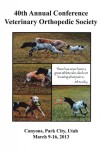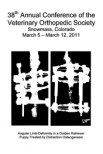Case history: Medical records of a single private practice (Illinois, USA) were retrospectively reviewed to identify dogs (n = 24) that had an open hip reduction with a transarticular suture stabilisation technique after presenting with a traumatic coxofemoral luxation between April 2003 and December 2018.
Clinical findings: Dogs that met the inclusion criteria were of various breeds with a median body weight of 18.1 (min 4.2, max 54.5) kg and mean age at presentation of 6.5 (min 1, max 11) years. The surgical technique, short-term outcome and complications were extracted from the medical records. Long-term (>2 years) follow-up data was obtained by a telephone interview with each owner.
Treatment and outcome: All dogs underwent open hip reduction using a novel transarticular suture stabilisation technique. The outcome was reported by owners to be excellent in 18/24 (75%) dogs with full return of limb function. Sixty-six percent (16/24) of owners reported that no lameness was observed 2 months after surgery. No minor complications were noted in this study. The hips of 6/24 (25%) dogs reluxated after surgery (defined as a major complication), which required femoral head and neck excision surgery.
Clinical relevance: Open coxofemoral joint reduction using a novel transarticular suture technique is a viable surgical option to consider in dogs that present with a traumatic coxofemoral luxation.









